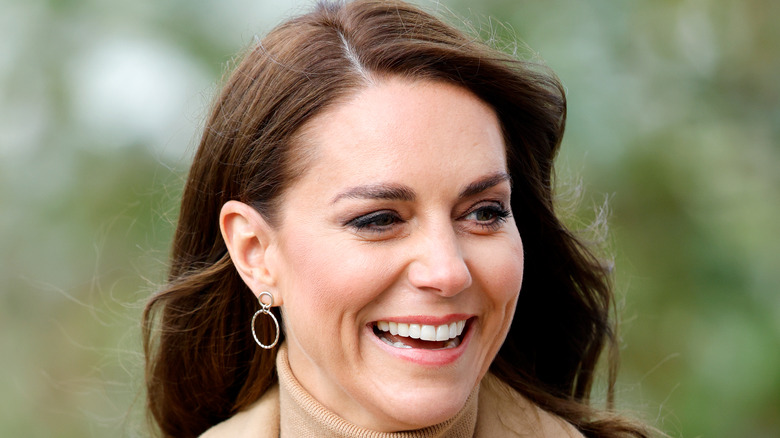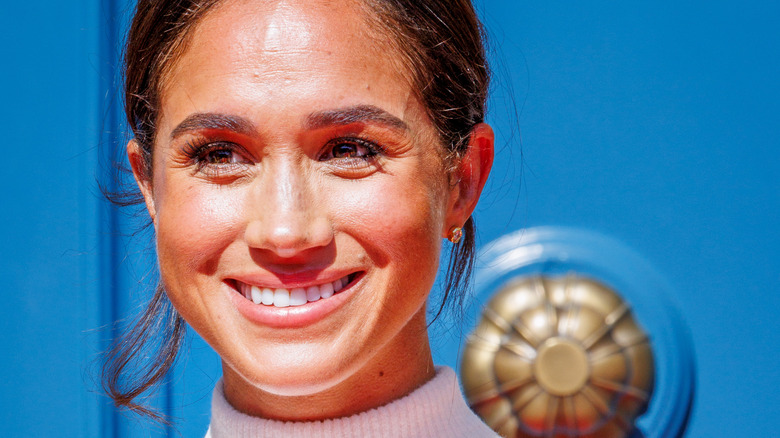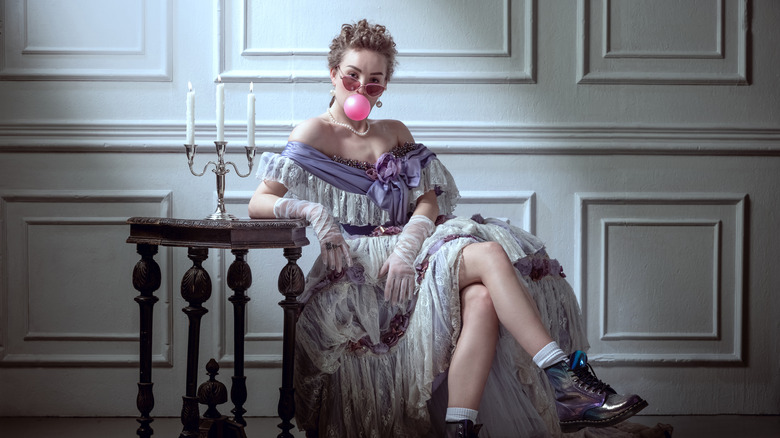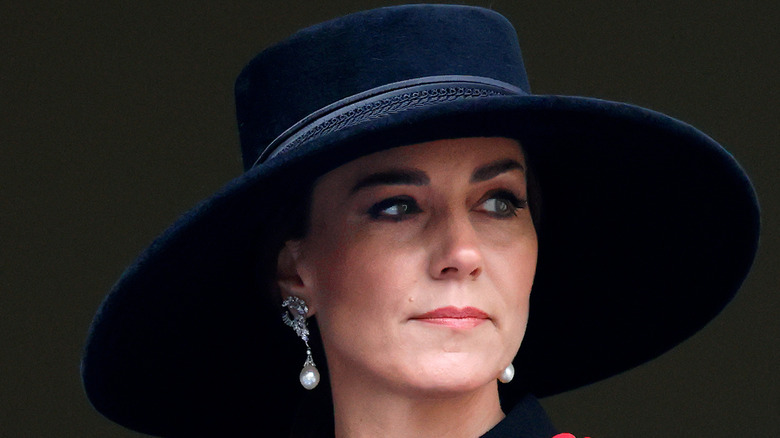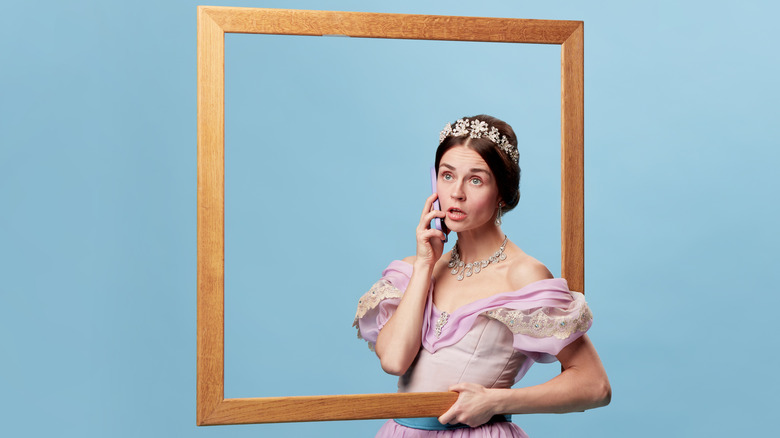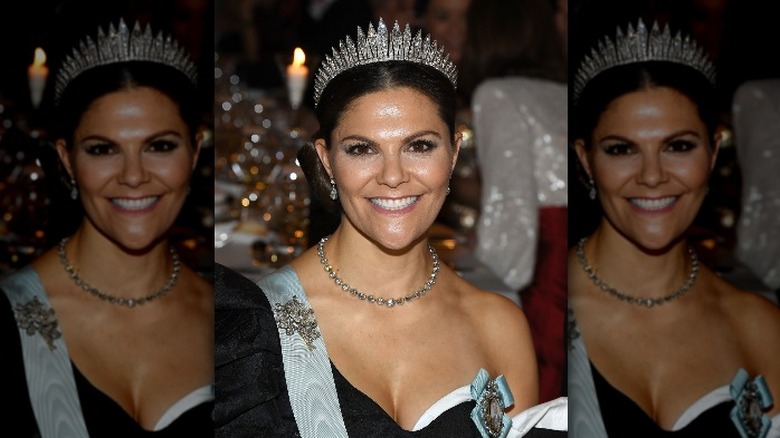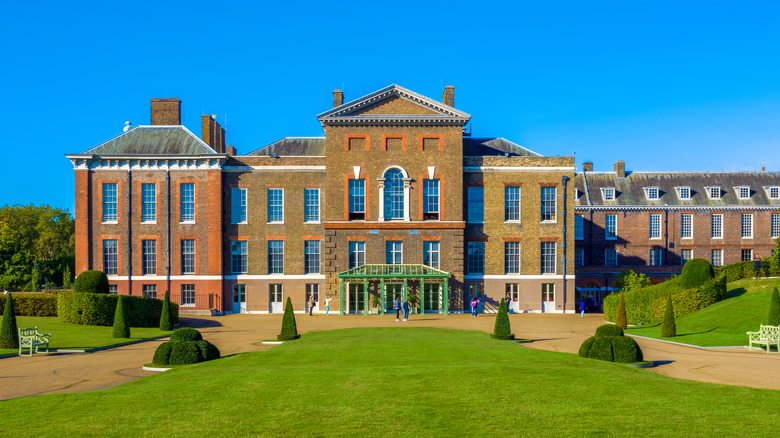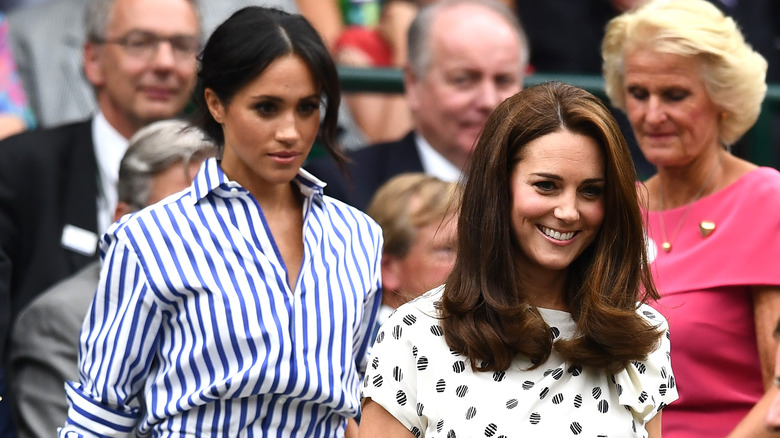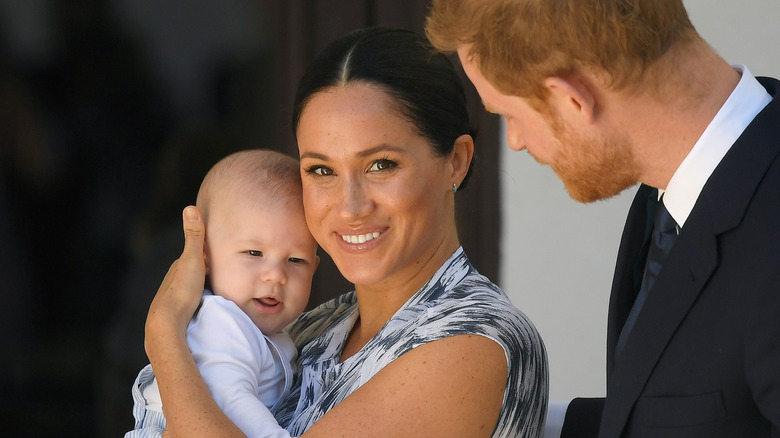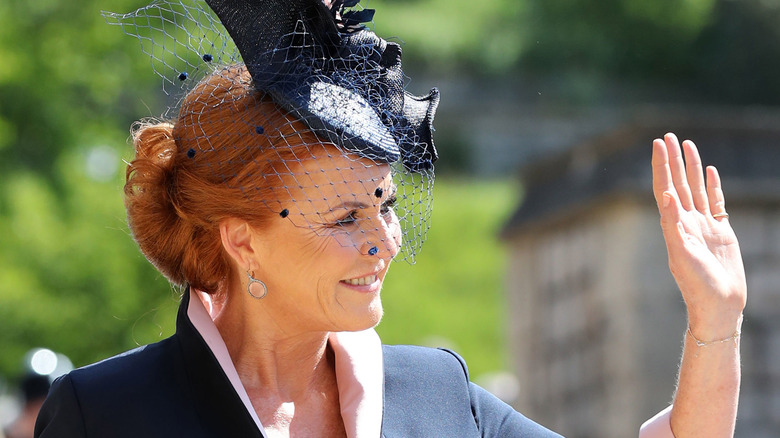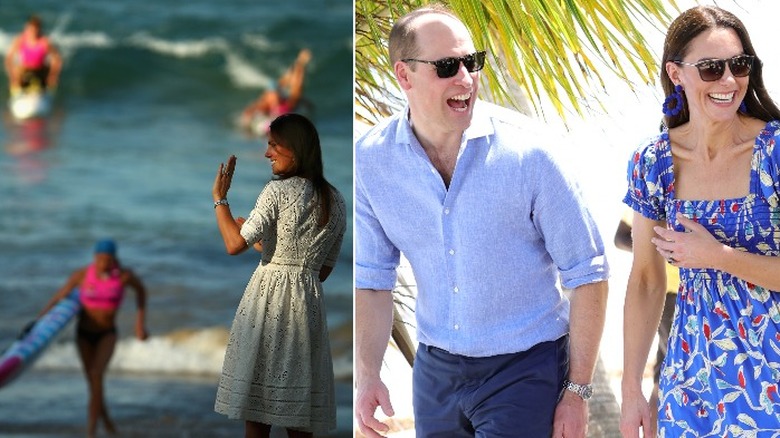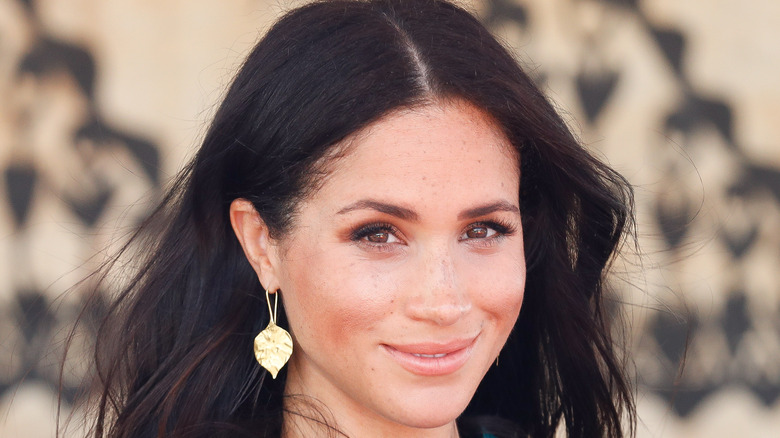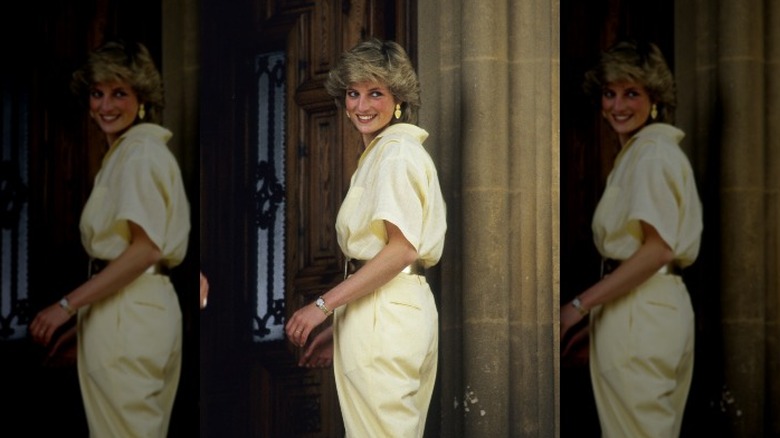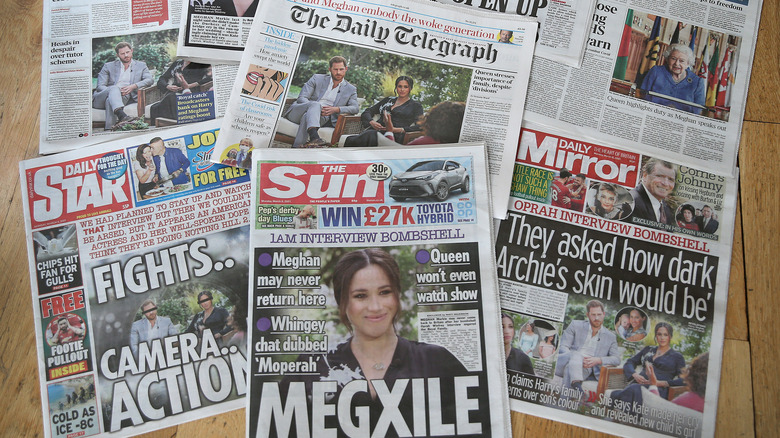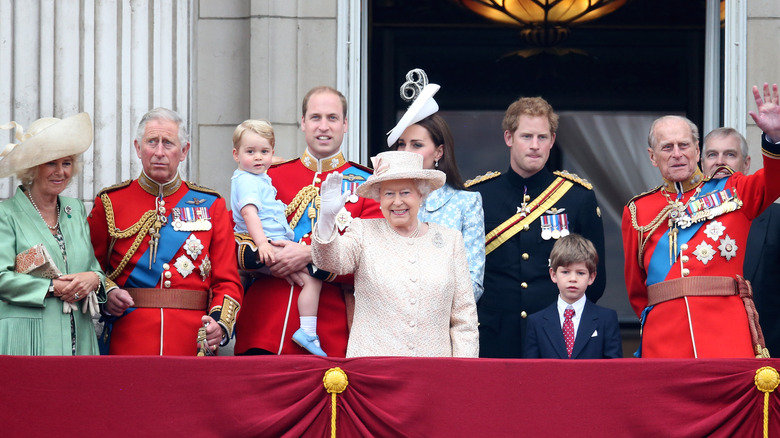What Does It Really Mean To Be A Duchess?
Call it the "Bridgerton" effect, or maybe an uptick in "The Crown" viewers, but lately it seems everyone is interested in all things related to dukes and duchesses. After Season 2 of "Bridgerton" was released in spring 2022, Netflix released a statement reading, "After four weeks atop the English TV list, Lady Whistledown is most pleased to reveal that 'Bridgerton' Season 2 has ascended to the #1 spot on the Most Popular list with 627.11M hours viewed, ahead of 'Bridgerton' Season 1 in second place."
Additionally, according to Overnights.tv, "The Crown" Season 5 racked up an impressive 1.1 million viewers on launch day on November 9, 2022 (via Variety). As many of us know from watching all the real (or fictionalized) royal dramas play out, there are a lot of rules and intricacies to the inner workings of royal life that are not always straightforward. You may be watching your screen while scratching your head trying to figure out, "What exactly is a duchess?" So, Your Grace, if you are ready, we are here to help demystify all the royal happenings as they pertain to duchesses. From terminology, to rules, to the process of acquiring a title, below you will find the complete guide to everything you have ever wanted to know about being a duchess.
What is a duchess?
Merriam-Webster defines the word duchess as: "the wife or widow of a duke; a woman who holds the rank of duke in her own right." The etymology of the word derives from the feminine form of the Latin dux, "leader or commander." Within the context of nobility, the title of duke or duchess ranks immediately below the monarch (excluding the monarch's immediate family members) and is considered the top of the British peerage, which contains five ranks: duke/duchess, marquess/marchioness, earl/countess, viscount/viscountess, and baron/baroness (via Historic U.K.). In European tradition, the territory that a duke or duchess rules over is referred to as a duchy. A few notable duchies that still exist are the Duchy of Lancaster, the Duchy of Cornwall, and the Grand Duchy of Luxembourg (via Scholarly Community Encyclopedia). For contemporary women who have filled the role of duchess, they say the royal position means to them an opportunity to use their position to influence the world for the better. Meghan Markle, the Duchess of Sussex, eloquently said, "With fame comes opportunity, but it also includes responsibility — to advocate and share, to focus less on glass slippers and more on pushing through glass ceilings. And, if I'm lucky enough, to inspire."
How do you become a duchess?
Have you ever dreamt of becoming an elegant royal that lives in a stately castle in a far-off European land? Unfortunately, for all you hopeful ladies out there waiting for your royal knight in shining armor to sweep you off your feet and make you a princess and/or duchess, we are sorry to burst your bubble — but making that transition is neither commonplace nor easy. The Los Angeles Times estimates, using the Drake Equation, that the odds of marrying a prince is about one in a million.
However, if the stars align and you happen to be placed upon the path to royalty, there are two main routes of acquiring the title of duchess. The first way is when the reigning monarch grants their permission of utilizing the duchess rank through the act of marrying a duke or soon-to-be duke. The second way is for already-established royal family members, who can request to elevate their rank once a higher title becomes vacant, or during a life event such as their own wedding day (per Debrett's).
Rules duchesses must follow
Royal life comes with the burden of following the strict guidelines that are in place to preserve tradition and protect the reputation of the royal family. Its members are expected to act in accordance with proper royal protocol throughout their daily lives. After studying the royal protocol, we have picked out some highlights.
Royals, including duchesses, should not engage in excessive PDA because it does not appear professional. Working royals are also not allowed to hold a political office, vote, and are discouraged from expressing any personal political views. Another no-no is signing autographs or taking selfies with fans, and royals must travel with all black outfits to be prepared for any sudden deaths within the family. Finally, for royal proposals and weddings, the monarch must approve of engagements before the proposal, as well as the wedding dress prior to the wedding (via Marie Claire).
As you can see, not even royals are above the rules!
Differences between duchesses and princesses
Determining the difference between a princess and a duchess is where things can get a bit tricky. Many say the main difference is that to be considered a princess, you must be born into a royal family, while someone who is not of royal standing can marry a duke and then can acquire the duchess title. Princesses may become duchesses later in life depending on whom they marry, the line of succession, and open titles with the family. For duchesses looking to become princesses, this primarily happens when the woman marries the heir to the throne (e.g. Kate Middleton, Diana Spencer) (via The Sun).
Some royal experts will note that technically, after the wedding, the bride takes on her spouse's title. For example, when Kate Middleton got married, per royal protocol, she not only acquired the Duchess of Cambridge title but also her husband's title, making her Princess William of Wales. Additionally, Meghan, Duchess of Sussex, inherited the name Princess Henry of Wales after she married Prince Harry (via Reader's Digest). So, depending on how you style a woman's title (styled by her own name versus the stylized title of her husband) can change the way to which she is referred. Long live the princess versus duchess debate! (via Insider).
Countries that have duchesses
In modern times, the most well-known country for boasting duchesses would have to be England, with their celebrity-status British royal family. However, you may be surprised to hear that there are other countries that still actively have dukes and duchesses within their lands such as Sweden (Victoria Ingrid Alice Désirée Duchess of Västergötland), Belgium (Princess Elisabeth, Duchess of Brabant), and Luxembourg (Maria Teresa Grand Duchess of Luxembourg) to name a few.
Duchesses within England, Sweden, and Belgium all have roles that are more unifying and representative in nature. In contrast, the Grand Duke and Grand Duchess of Luxembourg rule the country, so they have a much stronger political and active presence (per Cour grand ducale). The European Union describes the Grand Duchy of Luxembourg as "a parliamentary constitutional monarchy (Grand Duchy) with a head of government — the prime minister — and a head of state — the Grand Duke — who has only formal rights."
Do duchesses live in castles or specific housing?
Many of the duchesses within the British Royal Family live on a property owned by the Crown Estate, which is a collection of properties that belong to the royal family (via U.K. Government). Aside from Buckingham Palace, where the Queen resided, Kensington Palace is considered one of the most iconic residences. As of this writing, notable current residents at Kensington Palace include the likes of the Prince and Princess of Wales and their kids; the Duke and Duchess of Gloucester; the Duke and Duchess of Kent; and the Prince and Princess Michael of Kent (per Historic Royal Palaces).
Meghan Markle, Duchess of Sussex, and her husband Prince Harry are one notable exception: The couple previously lived at Kensington Palace, but in January 2020 broke from tradition and decided to step down as senior members of the royal family. Meghan and Harry now live in a $14.65 million home in the upscale Santa Barbara neighborhood of Montecito (per Dirt). When it comes to housing, royals appear to have some extraordinary options.
A look at the best duchess fashion
Duchesses are expected to present themselves in a way that is ladylike and honors their family and country. For the British royal family, modest hemlines, professional clothing, and natural hair and makeup are all general guidelines that duchesses should adhere to when appearing in public (via Cosmopolitan). Two contemporary examples of duchesses who are well-known for sporting iconic royal fashion are Princess Catherine of Wales (who is also the Duchess of Cambridge) and Meghan Markle, Duchess of Sussex.
Catherine, aside from her impeccable hair, is best known for her classic, chic, and buttoned-up sartorial taste. You will see her in more traditional silhouettes mixed with reserved patterns or colors. While Meghan, the former "Suits" star, has a style that is both classy and relatable. Meghan has a more laid-back elegance, which mixes contemporary silhouettes with a neutral color palette. Furthermore, in true American fashion, she is also a big fan of more casual staples like jeans and sneakers. However, laidback doesn't mean un-influential. In fact, in 2019, the fashion search engine Lyst ranked Meghan as the most powerful dresser in the world (per Harper's Bazaar).
What are the children of a duchess and duke called?
In a historical (albeit sexist) manner, the British peerage and title inheritance system primarily runs along male lineages. For example, kings, dukes, and princes can pass down their royal titles (prince and princess) to their children (and their place in line to the throne can influence their ability to pass down titles).
However, female members of the royalty cannot pass down their titles, and would need to seek special permission from the monarch to grant permission. As Reader's Digest notes, this is why Prince Andrew's daughters, Beatrice and Eugenie, are known as princesses, but Princess Anne's children do not have royal titles.
Additionally, an important rule passed by King George V in 1917 allows for royal titles to be bestowed upon the children of the sovereign's sons. Since the passing of the queen in September, Harry and Meghan's two kids — Archie Harrison and Lilibet Diana — are now eligible for royal titles because their grandfather King Charles III has taken his seat on the throne (via E! News).
What are the official duties of a duchess?
For the British Royal Family, duchesses who are active within the royal family have a range of royal duties that include philanthropic work, advocacy work, touring duties, public appearances, and supporting the royal family (per the royal family's website). While working within the bounds of the royal firm, duchesses technically are not permitted to have a commercial job outside of the royalty.
However, as Sarah Ferguson (aka Fergie) and Meghan Markle have demonstrated, once you are no longer part of the royal machine you are free to work in whatever capacity you so choose. For example, after Fergie divorced Prince Andrew, she went on to work in television and film, be a Weight Watchers ambassador, and has even become a children's book and historical romance author (per W Magazine). As of this writing, Markle has several ongoing projects: the Archewell organization, her own podcast "Archetypes," and a variety of Netflix and Spotify projects with her husband, Prince Harry (via The Cut).
The benefits of being a duchess
Being a duchess has some legit perks, if you're into public recognition and the finer things in life. Part of the royal treatment includes officially being addressed as "Your Grace" or "Royal Highness" if you are part of the monarch's immediate family (via The English Manner). Another advantage of being a duchess is having access to an incredible array of royal fashion and jewelry that duchesses can either borrow or inherit. Additionally, as a duchess, you may be able to wake up in a fancy estate or castle and call it home. For example, at Kensington Palace, Prince William and Princess Catherine's apartment is said to have a whopping 20 bedrooms (per Insider).
Another perk afforded to royals is the opportunity to attend the best and most prestigious schools. Finally, a duchess who enjoys traveling and vacations is in luck, because the British royal family has a great assortment of vacation homes. But it is not just regional travel for the royals; luxury international vacations are also on the agenda. According to E! News, William and Catherine have taken lavish vacations in the Caribbean, including a stay in a Mustique villa that cost $30,000 per week.
Do duchesses receive a salary?
According to PopSugar, duchesses who are working royals for the British Royal Family do not receive a salary. So then, you may be asking who is bankrolling their lavish lifestyle? Besides the personal wealth of the royal family, some money comes from the people via taxpayer dollars, as well as the income of specific duchies.
Prior to Prince Harry and Meghan stepping down as senior royals, the vast majority (95%) of the couple's income came from the Duchy of Cornwall (per the BBC). The Duchy of Cornwall's website states that it is "a private estate established in 1337 which funds the public, charitable and private activities of the Prince of Wales and his family." In 2018-2019, the Duchy of Cornwall supplied more than £5 million in funds that covered professional and private expenses for Prince Harry, Meghan Markle, Prince William, and Kate Middleton (per the BBC). However, once a duchess becomes a non-working royal or divorces, she is able to pursue her own line of work and have a traditional salary (via Newsweek).
What happens if a duchess divorces or is widowed?
What starts as a beautiful fairytale romance may unfortunately end in devastating heartbreak and/or divorce. If a duchess decides to divorce or becomes widowed from her duke husband, her duchess title (and her children's titles) remains intact. The duchess title technically lasts a lifetime — unless the duchess decides to remarry, and then her title would indeed go away (per Express).
Additionally, if the duchess has a "Her Royal Highness" title, then the specific "Her Royal Highness" part would be stripped away after the divorce is finalized (via Mirror). In 1996, for example, when Princess Diana divorced Prince Charles and she had her "Royal Highness" title taken away, her son Prince William famously said, "Don't worry, Mummy, I will give it back to you one day when I am king." So, while love may not last forever, royal duchess titles just might just go the distance.
What is the worst thing about being a duchess?
From constant pestering from the press and paparazzi to a plethora of mandatory public engagements, once you remove the rose-tinted glasses, being a royal isn't always rainbows and sunshine. As Meghan Markle went on tell Oprah Winfrey in the groundbreaking interview from March 2021, there was an abundance of rules and regulations she had to follow, and she was discriminated against and silenced, which led Markle to have suicidal thoughts (via Oprah Daily).
Another pertinent example is Princess Diana who did not have an easy go at being a princess. She experienced loneliness, heavy scrutiny from the press, infidelity from her husband, and an eating disorder (per Vogue.) For Andrew Morton's 1992 biography on the Princess of Wales, titled "Diana: Her True Story," Diana sent the author personal recordings, saying, "The bulimia started the week after we got engaged and would take nearly a decade to overcome. My husband put his hand on my waistline and said: 'Oh, a bit chubby here, aren't we?' and that triggered off something in me — and the Camilla thing."
The lesson here, is that while being a princess or duchess from the outside can look like a dream come true, there are many aspects of royal life that are very difficult and that can have a severe toll on one's physical and mental health.
What are the most bizarre things about being a royal?
Can you imagine waking up and going into the bathroom to find someone has already squeezed toothpaste on to your toothbrush? What about going to tie your shoes and noticing that your shoelaces are perfectly ironed? These are a couple examples of wacky things that may come with royal life.
There are plenty of other strange traditions for the British royal family. Warm biscuits are kept at the ready for King Charles. The late Queen Elizabeth would have someone break in her new shoes, and she used bagpipes as her personal alarm clock. A few more strange traditions that affect the family's duchesses include members of the royal family getting weighed before and after Christmas dinner and Monopoly being banned within the family — a silly rule and potentially an inside joke amongst the family (per Reader's Digest). Being a member of the British royal family sounds like a privileged — yet strange — life.
So, if given the chance to become a duchess, would you take it?
